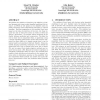Free Online Productivity Tools
i2Speak
i2Symbol
i2OCR
iTex2Img
iWeb2Print
iWeb2Shot
i2Type
iPdf2Split
iPdf2Merge
i2Bopomofo
i2Arabic
i2Style
i2Image
i2PDF
iLatex2Rtf
Sci2ools
113
click to vote
IUI
2003
ACM
2003
ACM
Abbreviated text input
We address the problem of improving the efficiency of natural language text input under degraded conditions (for instance, on PDAs or cell phones or by disabled users) by taking advantage of the informational redundacy in natural language. Previous approaches to this problem have been based on the idea of prediction of the text, but these require the user to take overt action to verify or select the system’s predictions. We propose taking advantage of the duality between prediction and compression. We allow the user to enter text in compressed form, in particular, using a simple stipulated abbreviation method that reduces characters by about 30% yet is simple enough that it can be learned easily and generated relatively fluently. Using statistical language processing techniques, we can decode the abbreviated text with a residual word error rate of about 3%, and we expect that simple adaptive methods can im
IUI 2003 | Language Text Input | Natural Language | Simple Stipulated Abbreviation | Software Engineering |
Related Content
| Added | 05 Jul 2010 |
| Updated | 05 Jul 2010 |
| Type | Conference |
| Year | 2003 |
| Where | IUI |
| Authors | Stuart M. Shieber, Ellie Baker |
Comments (0)

